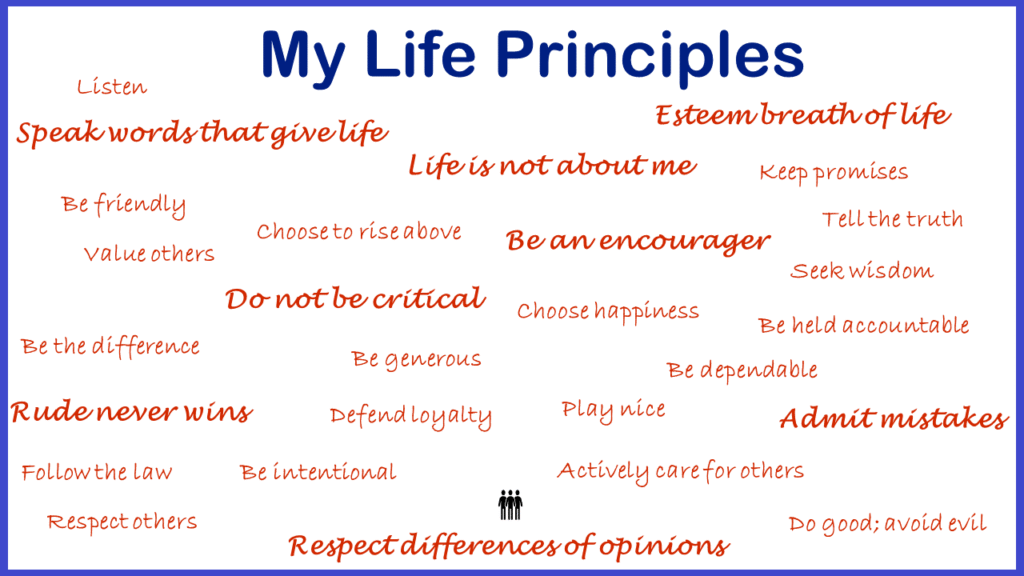
Every time I speak about ethics, I include one particular slide—a simple image titled “My Life Principles.”
It’s nothing fancy. Just a handful of phrases that have grounded me through the highs, lows, and ethical gray zones of life and business. But every time I show it, something happens in the room. The atmosphere shifts. People get quiet. Some lean in; others cross their arms. I can see it on their faces—the internal conversation that begins the moment I ask:
“What are your life principles? What do you live by?”
Then I give them a few minutes to write down their top three.
Some do it immediately, pen flying across the page. Others stare at the screen, frozen, as if the question itself feels invasive.
And inevitably, after the session, a few people come up to me and say, “You really stepped on my toes.”
That’s when I smile and reply, “Then maybe that was the truth tapping you on the shoulder.”
The Legacy of Values
Most of my life principles weren’t crafted in a boardroom or pulled from a business book. They were modeled—quietly, consistently—by my parents. I had the privilege of watching two people live with humility, faith, and integrity long before I ever understood the words.
Though my parents have been gone for many years, these foundational principles continue to thread through my work and my life—showing up in the way I serve my clients, write, speak, and simply show up for others.
My dad, especially, shaped the compass that still guides me. Years ago, he had a heart attack. At the time, I was living in California, in a great job surrounded by wonderful friends. But when I got that call, I knew. It was time to move home. He needed oversight. My parents needed help. And I needed to be there.
So I packed up my life, left my community, and returned to Texas. That decision wasn’t easy. But it was right.
It became the living proof of my first and most important principle:
Life is not about me.
That principle has become my mantra, my mission, and my north star.
Rick Warren may have popularized the phrase in The Purpose Driven Life, but I learned it firsthand, much earlier—in the messy, inconvenient, beautiful reality of caring for others.
Living for the purpose of helping others isn’t glamorous, but it’s deeply fulfilling. It threads through my work, my writing, and every conversation I have. It’s the heartbeat of my business and my life. Because when life becomes about serving others, everything else falls into its rightful place.
Learning to Speak Life
One of my other principles—Speak words that give life—came from a much different lesson.
I grew up with sarcasm as part of my DNA. It was how we joked, how we connected, and honestly, how we survived. But sarcasm is a double-edged sword—it cuts both ways. I didn’t realize that until one day, during a conversation with one of my dearest friends, I saw her flinch. I had said something sarcastic, intending humor, but what she heard was judgment.
That moment hit hard. I loved her. I never wanted to wound her. But I did.
So I began the long, humbling work of changing how I spoke.
It took years to untangle the habit of quick, cutting humor and replace it with genuine encouragement.
Today, Speak words that give life isn’t just a principle—it’s a promise.
Words matter. They heal or they harm. They create or they destroy. They can inspire courage or feed despair. And in a world already filled with criticism and contempt, I want to be someone who speaks life.
Rude Never Wins
If you’ve been alive for more than 30 seconds online, you already know this:
We’ve forgotten how to talk to each other.
Our culture thrives on outrage, fueled by algorithms that reward division. We post things we’d never say to someone’s face.
We attack rather than discuss. We dismiss rather than understand.
But rude never wins.
That’s not just a saying—it’s a truth I’ve seen play out in both business and life.
Criticism rarely changes hearts. Rudeness never earns respect.
It might get clicks, but it doesn’t create change.
That’s why another of my life principles is Do not be critical.
It’s not because I’m above criticism—believe me, I’ve earned plenty of it.
It’s because criticism without compassion corrodes character, both in the giver and the receiver.
We are seeing this played out daily now in our politics.
I don’t want to be known as harsh or judgmental, and I don’t want to surround myself with those who are.
Life is too short to spend time with people who thrive on tearing others down.
Respect Differences of Opinion
If I could add one principle to everyone’s list today, this would be it.
Respect differences of opinion.
We’ve lost the art of disagreement.
We’ve confused conviction with contempt.
We think “different” means “dangerous.”
But real ethics—personal ethics—means respecting others even when we disagree with them.
That doesn’t mean silence. It doesn’t mean compromising truth.
It means listening before reacting. It means remembering that people are complex, not caricatures.
And it means realizing that respect is the foundation of both civility and leadership.
Choose Happiness. Be Intentional.
The simplest principle on my list may be the hardest to live: Choose happiness.
Not the fleeting kind that depends on everything going right—but the deep, intentional kind that sees beauty even when life feels heavy.
I wrote about this recently in a post titled What Brings You Joy? Because joy, like ethics, is a choice. It’s not something you stumble into—it’s something you cultivate.
Choosing happiness requires slowing down, noticing the good, and refusing to let cynicism take root.
When I walk my dog and see her pure delight at simply being outside, I’m reminded that joy often lives in the ordinary. We just have to pay attention.
The Ethics of Intentional Living
Ethics isn’t only about right and wrong—it’s about intention.
It’s about the quiet, daily choices that define our character long before anyone is watching.
When I teach ethics, I tell people that every act of embezzlement, every betrayal, every moral failure begins long before the act itself. It begins with a compromise of principle—a justification that whispers, no one will notice.
That’s why personal ethics matter.
If your principles aren’t defined before the storm, they’ll dissolve when it hits.
When I display my Life Principles slide in a room full of professionals, I’m not trying to impress them—I’m inviting them to reflect.
To look inward.
To remember who they said they wanted to be before the noise, the pressure, and the politics crept in.
Your Challenge: Write Your Own Principles
If you’ve never written your own life principles, I challenge you to start.
Not a mission statement. Not a company value list. Just your principles—what you want to live by, be remembered for, and pass on to those who follow you.
Start with three.
Make them specific. Make them actionable. And make them honest.
Because if you don’t define your principles, someone else’s will define you.
That’s why I close many of my talks with this exercise—because it reconnects ethics to something deeply personal. It’s not about compliance. It’s about character.
And character, once built, becomes the strongest foundation you’ll ever stand on.
Closing Thought
The photo above—my life principles—represents decades of trial, grace, failure, and growth.
Each one carries a story, a lesson, and a reminder of who I want to be in every room I enter.
If your organization, team, or association needs a message that bridges ethics, purpose, and heart, I’d love to bring this conversation to you. Because ethics isn’t a class. It’s a calling. And living by your principles might just be the most radical act of leadership left.

